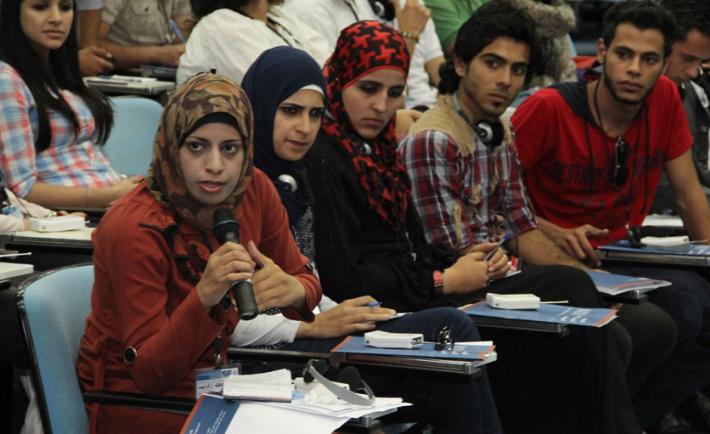Each week NDI’s Citizen Participation team provides a resource to assist NDI staff in meeting the objectives of their programs. This past month’s resources analyzed the process of building advocacy skills, the transformative potential of online videos for training, and a range of tactics and interventions that citizens and civil society can use to hold governments to account. These resources provide tools and insights that can help citizens strengthen their ability to effectively engage in political processes and bring about social and political change.
 Power, Rights & Participation: A practical guide for youth action in a post-2015 world, published by the British Youth Council, Plan UK, ActionAid, and Restless Development, aims to strengthen the advocacy skills of young people to influence the 2030 Agenda for Sustainable Development (SDGs). Although the SDGs have already been agreed upon, the resource can be used to support citizen participation and advocacy efforts for diverse campaigns beyond the SDGs or youth issues. The toolkit contains seven modules to guide citizens through the process of building advocacy skills which include: learning about their rights, the principles of governance, power structures and relations, and advocacy action planning. The modules can be used in sequence as a step-by-step tool for strategizing an advocacy plan or independently to strengthen specific skills.
Power, Rights & Participation: A practical guide for youth action in a post-2015 world, published by the British Youth Council, Plan UK, ActionAid, and Restless Development, aims to strengthen the advocacy skills of young people to influence the 2030 Agenda for Sustainable Development (SDGs). Although the SDGs have already been agreed upon, the resource can be used to support citizen participation and advocacy efforts for diverse campaigns beyond the SDGs or youth issues. The toolkit contains seven modules to guide citizens through the process of building advocacy skills which include: learning about their rights, the principles of governance, power structures and relations, and advocacy action planning. The modules can be used in sequence as a step-by-step tool for strategizing an advocacy plan or independently to strengthen specific skills.
 Click! Using YouTube as a training tool, published by INTRAC, explores YouTube’s potential as a tool for the innovative trainer and a medium to support civil society development. It covers how to use a video in the context of an effective training and also suggests particular video clips under topic headings relevant to citizen participation. Online video can be effective, however, only if used strategically. Trainers must consider that watching a video is a passive exercise, whereas participatory exercises which engage citizens directly and actively are critical for building their skills and capacity.
Click! Using YouTube as a training tool, published by INTRAC, explores YouTube’s potential as a tool for the innovative trainer and a medium to support civil society development. It covers how to use a video in the context of an effective training and also suggests particular video clips under topic headings relevant to citizen participation. Online video can be effective, however, only if used strategically. Trainers must consider that watching a video is a passive exercise, whereas participatory exercises which engage citizens directly and actively are critical for building their skills and capacity.
 Our Money, Our Responsibility: A Citizens’ Guide to Monitoring Government Expenditures, published by The International Budget Partnership strives to help citizens and CSOs track how their governments make and execute budgets. The first part of the guide is an overview of government budget implementation processes, while parts two through five offer four strategies through which citizens and CSOs can track and monitor expenditures: budget execution, procurement, measuring impact, and the audit and legislative oversight process. Budget monitoring is a process by which citizens and civil society can hold governments accountable for service delivery. By engaging with budget processes continuously, citizens can communicate their priorities and expectations to decision makers in order to increase their impact on how public funds are allocated and spent.
Our Money, Our Responsibility: A Citizens’ Guide to Monitoring Government Expenditures, published by The International Budget Partnership strives to help citizens and CSOs track how their governments make and execute budgets. The first part of the guide is an overview of government budget implementation processes, while parts two through five offer four strategies through which citizens and CSOs can track and monitor expenditures: budget execution, procurement, measuring impact, and the audit and legislative oversight process. Budget monitoring is a process by which citizens and civil society can hold governments accountable for service delivery. By engaging with budget processes continuously, citizens can communicate their priorities and expectations to decision makers in order to increase their impact on how public funds are allocated and spent.
 CSOs holding governments to account, published by GSDRC, explores the variety of interventions that CSOs, operating across a range of contexts, use to help citizens hold governments to account. Broad distinctions are made in the report to describe different types of CSO interventions and their impacts. For example, CSOs can try to galvanize broad-based public opinion or lobby personal contacts behind the scenes. In practice, however, CSOs are likely to engage several types of interventions simultaneously, including legal mechanisms, media campaigns, social audits, and coalition building. The CSO interventions featured in the report have different types of impact, including changes in government policy, increased transparency, improved livelihood outcomes, and reduced local-level corruption.
CSOs holding governments to account, published by GSDRC, explores the variety of interventions that CSOs, operating across a range of contexts, use to help citizens hold governments to account. Broad distinctions are made in the report to describe different types of CSO interventions and their impacts. For example, CSOs can try to galvanize broad-based public opinion or lobby personal contacts behind the scenes. In practice, however, CSOs are likely to engage several types of interventions simultaneously, including legal mechanisms, media campaigns, social audits, and coalition building. The CSO interventions featured in the report have different types of impact, including changes in government policy, increased transparency, improved livelihood outcomes, and reduced local-level corruption.

